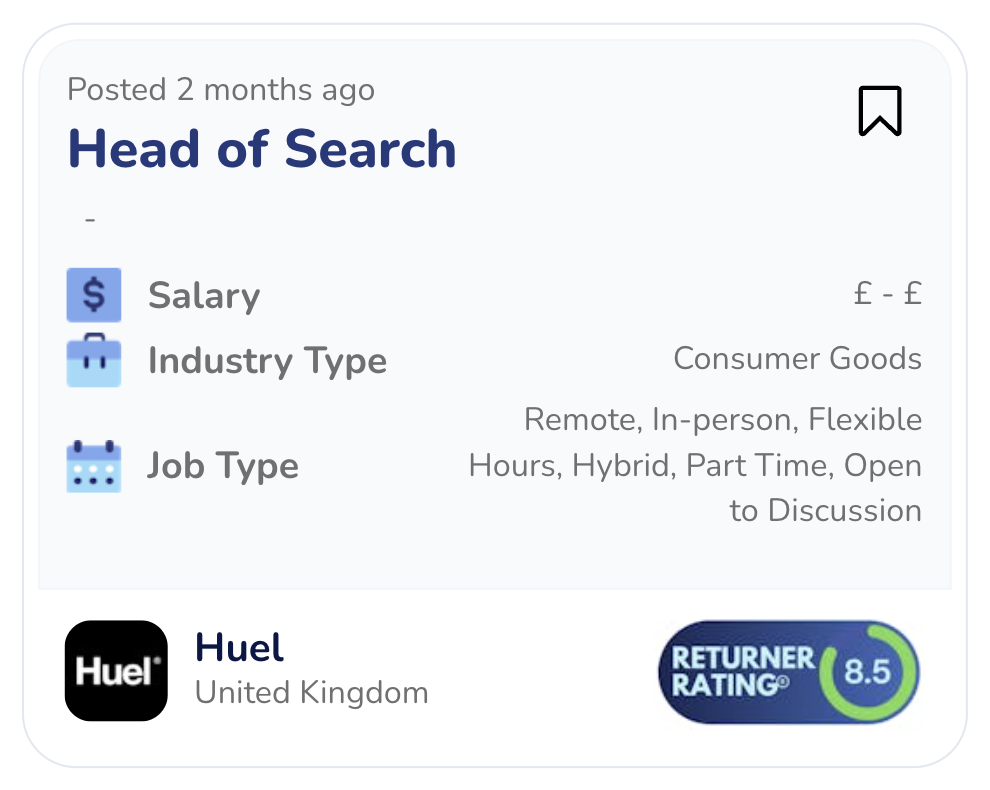Maternity leave can be a time of immense change, and as the end of it approaches, many mothers face a difficult question: should they return to work or stay home? If you’re considering not returning to work after maternity leave, this guide will help you make an informed decision while covering financial planning, legal obligations, and emotional adjustments.
Find roles that work for you
With varying levels of flexibility
Jump to:
- Deciding not to return to work after maternity leave
- Questions to ask yourself
- Financial planning for not returning to work after maternity leave
- Legal rights and employer notification
- How to communicate your decision to your employer
- Sample resignation letter
- Adjusting to life as a stay-at-home parent
- Overcoming guilt and managing societal expectations
- Reassessing career goals and addressing career gaps
- Exploring flexible career options later
- Building a support network and embracing your new identity
- Conclusion: Navigating life beyond maternity leave
Deciding not to return to work after maternity leave: key considerations
Making the decision to stay home can be complex. Here are a few factors to reflect on:
Questions to ask yourself
Financial planning for not returning to work after maternity leave
Staying home can impact your household budget, so proper planning is essential.
Steps to financially prepare:
- Review your budget: Identify essential expenses and areas where you can cut back.
- Explore benefits: In the UK, you may be eligible for Universal Credit, Child Benefit, or other government support.
- Save beforehand: Build an emergency fund to help cover unexpected expenses.
- Consider part-time or freelance work: If possible, explore side income opportunities to supplement household finances.
Tip: Use budgeting apps to help track expenses and plan ahead.
Legal rights and employer notification
If you decide not to return, it’s important to understand your legal rights in the UK.
Your rights under UK law:
Holiday pay
You’re entitled to be paid for accrued annual leave even if you don’t return to work.
Notice period
Check your employment contract for the required notice period to inform your employer.
Maternity pay
You typically won’t need to repay Statutory Maternity Pay (SMP), but company-specific maternity benefits may require repayment if you don’t return.
How much notice to give:
Most employers require at least the standard contractual notice, often four weeks, but check your company’s maternity leave policies.
Worried about returning to work in future?
We're here to help. Join our return-to-work community to stay up to date.
Join the community!How to communicate your decision to your employer
Resigning after maternity leave can be sensitive. Here’s how to handle it professionally:
Schedule a meeting:
- Request an in-person or virtual meeting to discuss your decision.
Be honest:
- Explain your reasons respectfully and thank them for the opportunity.
Provide written notice:
- Follow up with a formal resignation letter outlining your notice period.
Sample resignation letter template:
Subject: Resignation following maternity leave
Dear [Manager’s Name],
I hope you are well. I am writing to formally resign from my position as [Your Role] at [Company Name], effective [Date].
This has been a difficult decision, but after careful consideration of my family’s needs, I believe staying at home is the right choice at this time.
Thank you for the support and opportunities provided during my time with the company. I am happy to assist with the transition during my notice period.
Kind regards,
[Your Name]
Don’t let your CV get out of date.
Join our free online CV Masterclass to find out how you can frame your career break on your resume:
Thinking about how you're going to return to work?
We're here to help. Check out our Return to Work Bootcamp:
Find out moreAdjusting to life as a stay-at-home-parent
Transitioning to life at home can feel overwhelming, but creating structure will help.
Tips for creating a new routine:
Overcoming guilt and managing societal expectations
It’s common to feel guilty or face societal pressure about not returning to work. Here’s how to address it:
Acknowledge your feelings
It’s okay to feel conflicted – talk to someone you trust.
Redefine success
Success doesn’t have to be tied to a job.
Stay connected professionally
Maintain your LinkedIn profile and stay informed about industry trends.
Reassessing career goals and addressing career gaps
If you plan to return to work in the future, long-term planning is crucial.
Upskill in new areas like generative AI
Get a personal CV review from industry experts
Exploring flexible career options later
Staying home doesn’t have to mean the end of your professional life.
Remote work:
- Many roles offer flexibility for stay-at-home parents.
Freelancing:
- Pursue freelance work in your field or a new area of interest.
Starting a business:
- If you’re entrepreneurial, consider starting a small business.
Building a support network and embracing your new identity
Support is key to making the transition smooth.
- Join online communities: Many UK-based Facebook groups and forums are tailored to stay-at-home parents.
- Attend local events: Participate in local workshops and family-friendly activities.
- Accept your new role: Embrace the unique experiences and skills that come with being a stay-at-home parent.
Join our online community for women with career breaks:
You’ll find:
👉 Latest regulatory changes regarding maternity leave
👉 CV templates for women returning to work
👉 Latest industry updates
👉 Resources and guides to help you on your job hunt
👉 Confidence-building events, webinars and advice on all aspects of returning to work
Our Facebook community

Deciding not to return to work after maternity leave is a deeply personal choice that requires careful consideration. By planning ahead financially, understanding your rights, and building a support system, you can make the transition with confidence. Remember, there is no right or wrong choice – only what’s best for you and your family.
Featured Blog Posts









